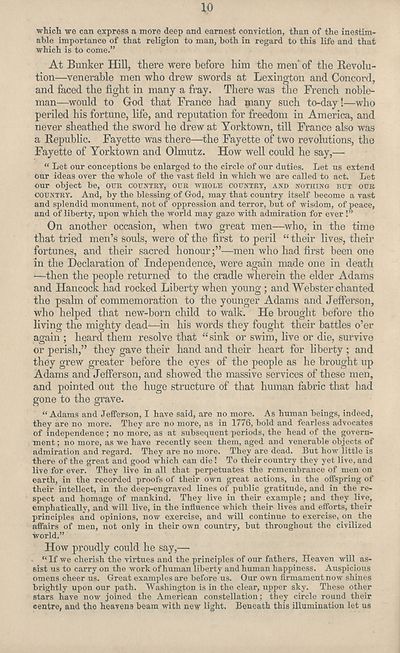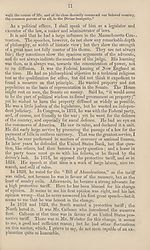Download files
Complete book:
Individual page:
Thumbnail gallery: Grid view | List view

10
which we can express a more deep and earnest conviction, than of the inestim¬
able importance of that religion to man, both in regard to this life and that
which is to come.”
At Bunker Hill, there were before him the men’ of the Revolu¬
tion—venerable men who drew swords at Lexington and Concord,
and faced the fight in many a fray. There was the French noble¬
man—would to God that France had many such to-day!—who
periled his fortune, life, and reputation for freedom in America, and
never sheathed the sword he drew at Yorktown, till France also was
a Republic. Fayette was there—the Fayette of two revolutions, the
Fayette of Yorktown and Olmutz. How well could he say,—
“ Let our conceptions be enlarged to the circle of our duties. Let us extend
our ideas over the whole of the vast field in which we are called to act. Let
our object be, OUB country, otjb whole country, and nothing but our
country. And, by the blessing of God, may that country itself become a vast
and splendid monument, not of oppression and terror, but of wisdom, of peace,
and of liberty, upon which the world may gaze with admiration for ever !”
On another occasion, when two great men—who, in the time
that tried men’s souls, were of the first to peril “ their lives, their
fortunes, and their sacred honour;”—men who had first been one
in the Declaration of Independence, were again made one in death
—then the people returned to the cradle wherein the elder Adams
and Hancock had rocked Liberty when young; and Webster chanted
the psalm of commemoration to the younger Adams and Jefferson,
who helped that new-born child to walk. He brought before the
living the mighty dead-—in his words they fought their battles o’er
again ; heard them resolve that “sink or swim, live or die, survive
or perish,” they gave their hand and their heart for liberty ; and
they grew greater before the eyes of the people as he brought up
Adams and Jefferson, and showed the massive services of these men,
and pointed out the huge structure of that human fabric that had
gone to the grave.
“Adams and Jefferson, I have said, are no more. As human beings, indeed,
they are no more. They are no more, as in 1776, bold and fearless advocates
of independence ; no more, as at subsequent periods, the head of the govern¬
ment ; no more, as we have recently seen them, aged and venerable objects of
admiration and regard. They are no more. They are dead. But how little is
there of the great and good which can die! To their country they yet live, and
live for ever. They live in all that perpetuates the remembrance of men on
earth, in the recorded proofs of their own great actions, in the offspring of
their intellect, in the deep-engraved lines of public gratitude, and in the re¬
spect and homage of mankind. They live in their example; and they live,
emphatically, and will live, in the influence which their- lives and efforts, their
principles and opinions, now exercise, and will continue to exercise, on the
affairs of men, not only in their own country, but throughout the civilized
world.”
How proudly could he say,—■
“ If we cherish the virtues and the principles of our fathers, Heaven will as¬
sist us to carry on the work of human liberty and human happiness. Auspicious
omens cheer us. Great examples are before us. Our own firmament now shines
brightly upon our path. Washington is in the clear, upper sky. These other
stars have now joined the American constellation; they circle round their
centre, and the heavens beam with new light. Beneath this illumination let us
which we can express a more deep and earnest conviction, than of the inestim¬
able importance of that religion to man, both in regard to this life and that
which is to come.”
At Bunker Hill, there were before him the men’ of the Revolu¬
tion—venerable men who drew swords at Lexington and Concord,
and faced the fight in many a fray. There was the French noble¬
man—would to God that France had many such to-day!—who
periled his fortune, life, and reputation for freedom in America, and
never sheathed the sword he drew at Yorktown, till France also was
a Republic. Fayette was there—the Fayette of two revolutions, the
Fayette of Yorktown and Olmutz. How well could he say,—
“ Let our conceptions be enlarged to the circle of our duties. Let us extend
our ideas over the whole of the vast field in which we are called to act. Let
our object be, OUB country, otjb whole country, and nothing but our
country. And, by the blessing of God, may that country itself become a vast
and splendid monument, not of oppression and terror, but of wisdom, of peace,
and of liberty, upon which the world may gaze with admiration for ever !”
On another occasion, when two great men—who, in the time
that tried men’s souls, were of the first to peril “ their lives, their
fortunes, and their sacred honour;”—men who had first been one
in the Declaration of Independence, were again made one in death
—then the people returned to the cradle wherein the elder Adams
and Hancock had rocked Liberty when young; and Webster chanted
the psalm of commemoration to the younger Adams and Jefferson,
who helped that new-born child to walk. He brought before the
living the mighty dead-—in his words they fought their battles o’er
again ; heard them resolve that “sink or swim, live or die, survive
or perish,” they gave their hand and their heart for liberty ; and
they grew greater before the eyes of the people as he brought up
Adams and Jefferson, and showed the massive services of these men,
and pointed out the huge structure of that human fabric that had
gone to the grave.
“Adams and Jefferson, I have said, are no more. As human beings, indeed,
they are no more. They are no more, as in 1776, bold and fearless advocates
of independence ; no more, as at subsequent periods, the head of the govern¬
ment ; no more, as we have recently seen them, aged and venerable objects of
admiration and regard. They are no more. They are dead. But how little is
there of the great and good which can die! To their country they yet live, and
live for ever. They live in all that perpetuates the remembrance of men on
earth, in the recorded proofs of their own great actions, in the offspring of
their intellect, in the deep-engraved lines of public gratitude, and in the re¬
spect and homage of mankind. They live in their example; and they live,
emphatically, and will live, in the influence which their- lives and efforts, their
principles and opinions, now exercise, and will continue to exercise, on the
affairs of men, not only in their own country, but throughout the civilized
world.”
How proudly could he say,—■
“ If we cherish the virtues and the principles of our fathers, Heaven will as¬
sist us to carry on the work of human liberty and human happiness. Auspicious
omens cheer us. Great examples are before us. Our own firmament now shines
brightly upon our path. Washington is in the clear, upper sky. These other
stars have now joined the American constellation; they circle round their
centre, and the heavens beam with new light. Beneath this illumination let us
Set display mode to:
![]() Universal Viewer |
Universal Viewer | ![]() Mirador |
Large image | Transcription
Mirador |
Large image | Transcription
| Antiquarian books of Scotland > Politics & government > Oration on the death of Daniel Webster > (14) |
|---|
| Permanent URL | https://digital.nls.uk/119198888 |
|---|
| Description | Thousands of printed books from the Antiquarian Books of Scotland collection which dates from 1641 to the 1980s. The collection consists of 14,800 books which were published in Scotland or have a Scottish connection, e.g. through the author, printer or owner. Subjects covered include sport, education, diseases, adventure, occupations, Jacobites, politics and religion. Among the 29 languages represented are English, Gaelic, Italian, French, Russian and Swedish. |
|---|

